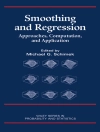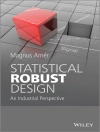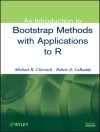The classical statistical problem typically involves a probability distribution which depends on a number of unknown parameters. The form of the distribution may be known, partially or completely, and inferences have to be made on the basis of a sample of observations drawn from the distribution; often, but not necessarily, a random sample. This brief deals with problems where some of the sample members are either unobserved or hypothetical, the latter category being introduced as a means of better explaining the data. Sometimes we are interested in these kinds of variable themselves and sometimes in the parameters of the distribution. Many problems that can be cast into this form are treated. These include: missing data, mixtures, latent variables, time series and social measurement problems. Although all can be accommodated within a Bayesian framework, most are best treated from first principles.
Зміст
1.Unobserved Variables.- 2.Measurement, Estimation and Prediction.- 3.Simple Mixtures.- 4.Models for Ability.- 5.A General Latent Variable Model .- 6.Prediction of Latent Variables.- 7.Identifiability.- 8.Categorical Variables.- 9.Models for Time Series.- 10.Missing Data.- 11.Social Measurement.- 12.Bayesian and Computational Methods.- 13.Unity and Diversity.
Про автора
David Bartholomew is Professor Emeritus of Statistics at the London School of Economics. He graduated from University College London and worked as a lecturer and then senior lecturer in statistics at the University College of Wales, followed by appointment to a chair in statistics at the University of Kent. He was then Professor of Statistics at the London School of Economics until his retirement in 1996. He is a Fellow of the British Academy, a Member of the International Statistical Institute, a Fellow of the Institute of Mathematical Statistics and has served as Honorary Secretary, Treasurer and President of the Royal Statistical Society. The focus of his recent research has been latent variable models and factor analysis












